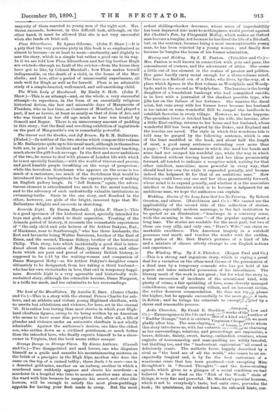Having and Holding. By J. E. Panton. (Trischler and Co.)—
Mrs. Panton is well known in connection with pots and pans, the concealment of corners, and the adornment of attics. She seems a little out of her element in the realms of passion and politics. Her guns hardly carry metal enough for a three-volume novel. The hero is a Radical son of a Duke, who lives, by-the-way, at a place which figures in the first volume as Woodyhido and Woody- hyde, and in the second as Windyholme. The heroine is the lovely daughter of a fraudulent bankrupt who had committed suicide, is in love with a journalist of the shadiest possible type, who jilts her on the failure of her fortunes. She marries the ducal scion, but runs away with her former lover because her husband is too intent on some wonderful Bill to compel the landlords to establish factories in every village. However, no harm happens. The quondam lover is fetched back by his wife, the heroine, after a little East-ending, returns to her home and her husband, whose wonderful Bill has been adopted by the Dukes, and England and the heroine are saved. The style in which this wondrous tale is told may be gauged by the following sentence, which is one of the least muddled in the book, and about half the length of most, a good many sentences extending over more than a page : "The graceful manner in which she used her hands and arms had not escaped his watchful eye, while tho way in which she listened without forcing herself and her ideas prominently forward, all tended to indicate a receptive mind, waiting for that other intellect, masculine, more powerful in every way, that should lead her own the while it expanded genially, and became indeed the helpmeet fit for that of an ambitious man." How listening could force any one and her ideas prominently forward, whose mind is to expand genially, and whether it is the masculine intellect or the feminine which is to become a helpmeet for an ambitious man, we hope the authoress can explain.










































 Previous page
Previous page